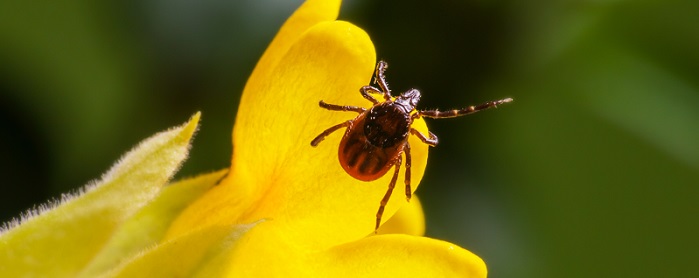
Spring has arrived to North Carolina, and you’re probably ready to break out shorts and sandals and get outside. But you’re not the only one ready to emerge from your home. Warm weather sees a massive uptick in dangerous pests and heralds the beginning of flea and tick season. To help you stay safe, our pest control company in Raleigh is sharing some tips on how to avoid getting bitten, stung, or injured by dangerous insects and pests.
Staying Safe from Ticks
In North Carolina, tick season begins in the spring, usually around April, and lasts through fall. Known for carrying dangerous diseases, such as Lyme, these parasitic arachnids are related to spiders but they have to feed off a host, such as a human or a dog, in order to survive.
Ticks live in tall grass, leaf piles, and shrubbery or overgrown areas where it’s damp and humid. As they pick up the scent of a possible host, they can attach themselves due to the spiny hairs and claws on each legs and will then look for a bare area to bite for food.
The good news is that ticks are pretty particular in their habitat, so you can protect your property with these steps:
- Keeping grass trimmed short.
- Cleaning up lawn debris – grass clippings, leaf litter, and overgrown brush.
- If your yard borders a wooded area, lay down a barrier of gravel or dry wood chips that’s three feet wide to prevent ticks from crawling into your yard.
You can also protect yourself and your kids by following these guidelines:
- Wearing long pants, socks, and long sleeves to minimize exposed skin.
- Avoid hiking or camping in grassy or overgrown areas. If you want to to out hiking, stick to the center of trails.
- Use EPA-registered insect repellents containing DEET, picaridin, or lemon eucalyptus essential oil.
- Check your clothing, skin, and hair for ticks regularly.
Preventing Chigger Bites
Also called red bugs, chiggers are larvae from mites that become active during warm weather and live in tall weeds and grass, much like ticks, plus berry patches. It’s important to note that only the larvae bite, and because they’re only 1/150 of an inch long, they’re almost impossible to spot with the naked eye unless they’re clustered together.
With sharp claws, chiggers attach to the host and inject saliva that contains an enzyme that breaks down skin cells and hardens the area, creating a “feeding tube” into the skin that allows the chiggers to feed for a few days. Bites are itchy, and form painful, reddish welts and bumps to form.
Like ticks, you can prevent chiggers by keeping your lawn trimmed short, wearing insect repellent and make sure you wear gloves, long sleeves, and pants when working in a berry patch or garden.
Avoiding Mosquitoes
You don’t even need to leave your deck or patio to deal with the most deadly animal in the world – the mosquito. While their bites are irritating and itchy, the real danger comes from their ability to transmit diseases, such as Eastern Equine Encephalitis (EEE), West Nile, and Zika Virus.
Like chiggers and ticks, if you want to prevent bites and keep yourself and your family safe, you want to make your property as inhospitable as possible to mosquitoes. Since they have to lay eggs in standing water, it’s important to follow these tips:
- Cover any kids’ pools or water tables when not in use.
- Eliminate any standing water, such as rain barrels or bird baths.
- Make sure gutters are cleaned out and downspouts are draining properly.
In addition to protecting your property, you also want to protect yourself by staying indoors around dusk and dawn, wearing long pants and shirts, and using a mosquito repellent with DEET, picaridin, or lemon eucalyptus.
Protect Yourself with Pest Control in Raleigh
The best way to keep yourself and your family safe when you’re outdoors is by working with a professional pest control company who can treat your yard and around your home. At Stomp Pest Control, we can eliminate ticks, mosquitoes, chiggers, and countless other dangerous pests so you can get outdoors and enjoy the lovely weather. To schedule service or learn more about our service, call us at 919-231-3292 or fill out our contact form below.

